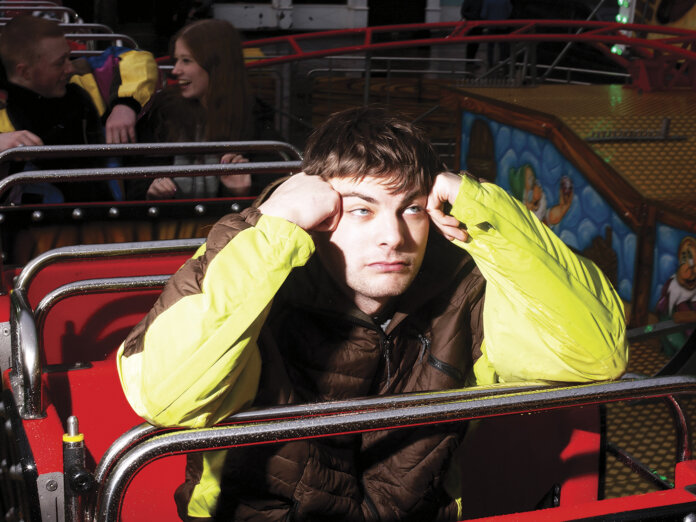The Uncut dated August 2023 features a lead review of Chaos For The Fly, the debut solo album from Grian Chatten of Fontaines DC. Here’s the full, unedited transcript of our conversation, in which Grian discusses the album, “some tough patches” and how the record will affect the next Fontaines LP: “I’m always writing… one outlet isn’t enough.”
_______________________
Tell me about the origins of the albums – when did you write the first songs?
I went for a walk around the coast of Dublin; a town called Skerries, where I’m from. The whole arrangement of “Bob’s Casino” came to me more or less fully formed. I didn’t want to insult the intelligence, or the ability of everybody else in the band by asking that they play 100% what I had written, so I decided to do it myself. The album started towards the end of lockdown and the rest came together during tour, when I was in a bit of a bad way.
What’s the timeline of writing and recording and how did it fit around your work with Fontaines?
Fortunately I’m always writing currently, no matter the circumstance. One outlet isn’t enough, especially when you consider how long it takes to put out a record, so I need at least the two outlets at the moment.
What were the advantages and disadvantages of working without the band around you?
The main advantage is that it’s been incredibly quick. It’s usually quick when we make things as Fontaines, but we’ve not really had to check in on anyone, there’s been no chance of anything being compromised by democracy and there’s never been too many cooks in the kitchen – not that we have that problem too badly in the band – but the speed at which you can write and produce as a solo artist is really nice. The disadvantage is that it’s fucking lonely, and I laugh an awful lot less when I’m on my own than I do when I’m with the lads.
What themes did you want to explore and why did this need to be done as a solo record?
I found myself exploring the themes of addiction, isolation and depression, to be honest. I’ve been very hesitant thus far to talk about that in any interviews; maybe that’s because I’m afraid of a family member reading it and being worried about me, but I’m grand now. I went through some tough patches over the past year, where my personal life was in tatters and I didn’t really feel like I had anyone to turn to because we were bound to the road. That loneliness gave way to a lot of bitterness, alongside scepticism, cynicism, judgement and paranoia. One song, “All Of The People”, is the most misanthropic thing I’ve ever written.
Who helped you create the album – who were the other important figures in the writing and recording process?
I co-produced it with Dan Carey, I had two weeks off between tours and in those two weeks I went into the studio with Dan. There was a lovely sense of being able to do whatever we wanted; we could have a break and jump on the trampoline, it was that kind of energy. A lot of the production and arrangement decisions would have been discussed with Dan, but the majority of the project was written by me, and that was kind of the point.
It sounds like you needed to exorcise some demons for “All Of The People” – did it work?
It did work, yeah. About a month passed and the individual in that song had already started to feel like a snapshot of someone else. I was almost embarrassed by some of the lyrics when I wrote it, in the sense that it was so crudely misanthropic, there’s a line in it which says ‘people are scum’, and I thought it might have been a bit too much, but I decided that it was valid because it’s how I felt in the moment.
Several of these songs seem rooted in place – Fairlies, East Coast Bed, Bob’s Casino – can you tell me about what inspired this?
“East Coast Bed” is written about my old hurling coach from when I was growing up, a woman called Ronnie. She used to pick me up after school and I used to stay at her gaff on some weekdays because my parents were working a lot. She passed away last year, so the song “East Coast Bed” is about a bed in her place on the east coast of Dublin where I was able to find respite and home. Then, when we laid her in the ground, that was also an east coast bed for her, so the two choruses correspond to each of the beds. “Fairlies” is about escaping, there’s a line that says “I’m moving to America, you won’t see me for a while“; it’s about running away from reality and it feeds into the feelings of addiction. That song was influenced by a poem by Yeats called “The Stolen Child”.
What do you think you will bring to the next Fontaines LP from the experience of making a solo record?
This album has cleared the pathways a little bit, in terms of what I’ll be taking into the next Fontaines record. We already know what the next record is going to sound like, more or less, I can’t say too much about it, but it won’t be very similar to Chaos For The Fly, and that’s partially because of Chaos For The Fly.



